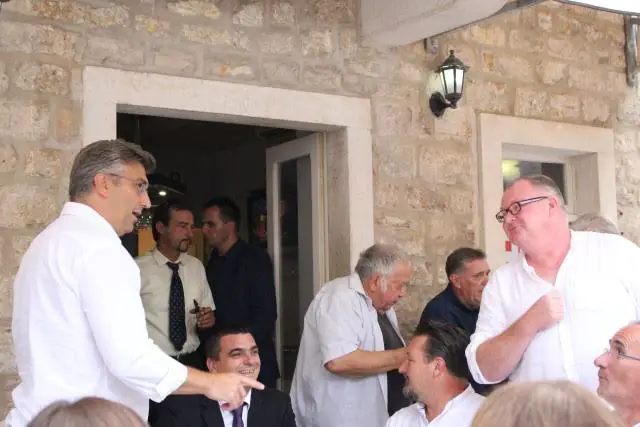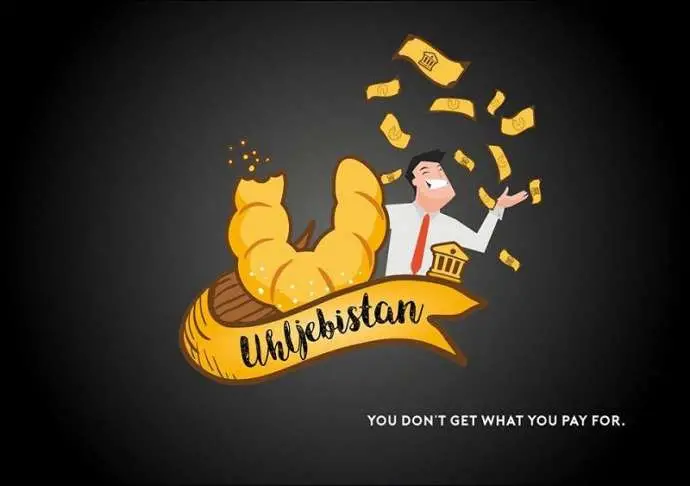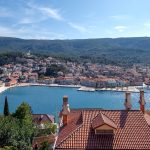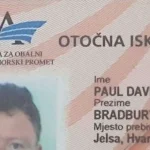Can you imagine living in a country for around 12 years as an expat and have absolutely no clue what was really going on, or how the country actually functioned?
Actually, looking at the hundreds of thousands of Brits in Spain who have little to no interaction with local customs, culture or language, I guess you can imagine. But having travelled to 96 countries and having lived in 10, I pride myself on at least understanding a little of the basics of my temporary new home.
And yet Croatia kept me fooled for SUCH a long time, showcasing its glossy exterior in my tourism bubble of Hvar, while hiding its darker realities of the daily grind.
Life on Hvar was good, and although I found the bureaucracy slow and public officials generally quite slow, lazy, and disinterested, I just assumed it was part of the Mediterranean charm.
I miss those days.
It was an era of innocent living in a beautiful country on a gorgeous island with an incredible lifestyle and very few stresses. And had I chosen to work in a field that did not touch Croatia too much, I could quite possibly have continued in that blissful ignorance. It sometimes amazes me how little expats of 20 years here know about the country or even the town they live in outside their bubble. But if their bubble gives them everything that they need, then perhaps it is understandable.
Writing about how wonderful Hvar was made me very popular on the island. Finally, someone was writing about more than the beaches and the nightlife, and in English too. And all was well until I started writing some constructively critical articles about certain topics, or echoed online (in a language that tourists could read!) some of the complaints doing the rounds in the local cafes.
And it was on one such topic that opened a Pandora’s Box and led me to hear the ‘U’-word for the first time, the entry point to the Mighty State of Uhljebistan, a State within a State that I had been blissfully unaware of for more than a decade in my adopted homeland.
As one would expect with the randomness of my life, the topic that introduced me to the word uhljeb – a word that would bring me one of my first two lawsuits in life 5 years later – was a simple attempt to get the bus timetables updated at the Jelsa Tourist Board. Somehow it became a national debate.
And here was the then Jelsa Tourist Board director announcing in the national media that he was not an uhljeb.
What the hell was an uhljeb, I wondered.
I shared the link on Facebook and asked for help
I became intrigued and I delved in deeper. And as I delved deeper into TCN and Croatia, I came across the Mighty State of Uhljebistan at every turn. And slowly, very slowly, I started to realise how Croatia really works, And that the main reasons for the crushing emigration in the 30 years since independence had more to do with the corruption and nepotism that rules this country.
But I am getting ahead of myself on this journey of discovery, for first we have to understand the meaning of this uhljeb word. I have been asked SO many times how one would translate uhljeb into English. Probably the best short explanation that I have found is the following:
Uhljebiti – to be fucked around by lazy and incompetent timeservers and dogsbodies appointed to positions in which they hold no qualifications or experience. Uhljebništvo – the act of appointment/employment of such a person to continue to behave in the manner and affect others with it – with an added point that there is no direct English translation because it is so scarcely seen in Western Europe.
The origins of the word itself seem interesting – U (in) plus hljeb (hleb is the Serbian word for bread). In bread, so I guess someone who is earning something. Given that many of the jobs are reserved for the family, I came up with my own definition.
An inbred in bread.
I think it sums it up rather well.
My viewpoint and appreciation of Croatia changed considerably after learning of the uhljeb world, so much so that I wrote an article called A Tale of Two Croatias: Before and After the Uhljeb Discovery back in 2016. This was followed by Welcome to Uhljebistan: A Foreign Appreciation of the Cult of Uhljeb.
My friendships with some Croatian friends changed. It was almost as though I had come over to the dark side, and they could now be freer in their interactions with me, now that I was beginning to understand what Croatia was really like, and what a struggle their daily lives were. It made me feel a little less in love with Croatia, the country, but much more so with the humans I was engaged with. I mourned the loss of my idyllic Croatian bubble, while trying to summon the agility and strength to navigate the murky waters ahead of me.
Suddenly, things became a lot clearer, and a lot more depressing. The useless official who hardly did anything was not due to him being lazy or incapable, it was more to do with the knowledge that his was a job for life, in exchange for his vote to keep the status quo of power. Be in the right party, help them stay in power, and a comfortable job for life, with guaranteed payment from the State budget on time every month was the reward.
The system was easy to spot once you knew what you were looking at, especially in smaller communities. Years ago, when I was starting Total Hvar, I went to the tourist boards on the island to support the project. I was told:
“We fully support this project, it is great, and we can give you any assistance you need, apart from one thing – money.” The thing I needed most.
“You will not get any money for one reason only,” a local friend told me cheerfully over a beer a decade ago. “Because you are not in a political party.” Why on earth would I want to be in a Croatian political party, I asked myself.
That was before I had come across the Mighty State of Uhljebistan. From watching communities in Dalmatia, I have seen how it works. In theory, the tourist board director should be the best candidate to promote tourism. Given the high level of English proficiency in Croatia, it is astonishing how many local tourist board directors cannot speak English well, or even at all.
And the local tourist board director is not chosen from within the tourist board framework, but by the President of the local tourist board, who also happens to be the Mayor. And the tourist board job is a very nice job indeed. A position the mayor can allocate with political patronage, or perhaps a job for his girlfriend. Apart from a nice comfortable life and existence, it also comes with a budget for events. And whose events get the funding? Perhaps those who deserve a thank you for their loyal votes.
Or perhaps the useful position of deputy mayor could be offered to someone whose husband was a popular figure around town, and very persuasive. Persuasive enough to get people to vote for his choice, with his wife as deputy mayor to show how wise the choice is. And if there was a guaranteed job in return, in which he didn’t really have to show up, apart from on pay day, well, where was the harm in that?
But it goes far deeper than this, as I learned when the Mayor of Jelsa, Niksa Peronja, announced in a public meeting (see above) that he was suing me (he never did). People turned away as I walked down the street, while messaging support and thanks privately for investigating the murky inner workings of a public tender. You have to understand, a local friend told me, that it is not personal, but that cafe owner over there supports you, but if he does so publicly, he might lose some extra outdoor tables next season. This is how Croatia works, so don’t take it personally.
I was shocked at how many people contacted me privately to thank me, then sent me more examples of alleged corruption, asking me to report on it.
“Sure, we can do it together.”
“No, no, please no. My name cannot be associated. I have children, you understand?”
And I don’t?

Who could I give all these alleged corruption cases to if not the Prime Minister? He was due in town the following week, and so I wrote him an open letter. He was gracious enough to call me over for a chat and ended by promising that he would never sue me.
So far, he has been true to his word. Thanks, PM!
There are many creative ways that these relationships are maintained. If I wasn’t currently being sued twice by the Croatian National Tourist Board (ironically one of them for a meme with that word uhljeb in it), I might have written the story someone had sent me regarding grants given by a certain ministry to businesses who were also donors to a certain political party. The person had collected the data over years, and the alignment of interests was astonishing. If I was a cynical chap, it would seem that the donors were putting cash in the party coffers, then receiving grants to their businesses to get their money back, with a bonus. Some of the businesses had little to do with the tender, but the party seemed to benefit quite nicely. Obviously I am not a cynic and so I am sure that was not what was going on.
That level of fear is very much alive in Croatia today, and sadly people will go along with the party line in return for those favours. I don’t judge them for it; it is a survival mechanism for many. But it will also slow down the pace of change.
Once one enters the world of the Mighty State of Uhljebistan, one learns that there are rules for those who have and those who have not. Those who are in the system, and those who are not. Those who can commit the most enormous crimes or steal large sums (let’s throw in the word allegedly there) with impunity, versus the cafe owner who will get a huge fine if the inspectors find so much as one extra kuna in the till compared to the paperwork.
The inspectors terrorise and they always find something. They have to, for how else is the Mighty State of Uhljebistan going to pay its army of uhljeb soldiers playing Angry Birds and the like in offices all over the country, so that they can continue to vote for the status quo?
And there are LOTS of mouths to feed. The number of municipalities is quite extraordinary, and (as is my understanding), far from being a legacy of the socialist era, the number of municipalities has actually increased since independence. When I moved to Hvar, for example, there were 5 tourist boards, each with their own director, and 4 municipalities, each with their own mayor. For a population of 11,000. And the best bit was that the tourist boards did not speak to each other – one of the reasons I started Total Hvar back in 2011. Many years ago, a friend of mine went into the Jelsa Tourist Board and asked for information about Stari Grad.
“This is the Jelsa Tourist Board, and we have information about Jelsa. These are the bus times for Stari Grad, where they have their own office. Ask them about what there is in Stari Grad.”
The efficiency of having two directors over one, at double the cost. A small snapshot of a much wider problem all over Croatia.

A few years ago, the Voice of Entrepreneurs Association did some incredible big data research in an attempt to come up with suggestions to reduce administration costs through data-driven solutions. Their findings suggested the reduction and merging of some municipalities, which would save some 1.29 billion kuna a year. You can read the article here. In one municipality, a staggering 72% of annual expenditure went on salaries of the administration, leaving only 28% for things like education and garbage collection.
But reducing the municipalities would mean reducing some of those patronage jobs, which would reduce those precious votes.
Not gonna happen.
And for those who do not like this system, or are excluded from it (and therefore many of the jobs and other opportunities), there has been one main option until now – emigration. People are voting with their feet on the streets of Dublin, Stockholm and Frankfurt.
It is easy to criticise Croatians for being sheep and voting for the same parties time and again. It seems illogical on the surface, but it becomes a little more understandable once you begin to understand the workings of the Mighty State of Uhljebistan. It also explains why the smart and young people are leaving.
I sometimes wonder how I would react if I had been born into the system, my family all from the same party, my parents’ jobs dependent on the party. It is easy to be a rebel in a cafe, less so when your livelihood is on the line. And so I don’t judge.
Happily, I think things are slowly changing. The outer walls of the Mighty State of Uhljebistan are starting to crumble. The twin viruses of technology and transparency are here, and EU membership has brought some extra scrutiny.
But there is also a new breed of Croat – the entrepreneur – headed up the first Croatian unicorns of Infobip and Rimac – who are bypassing the system and doing their own thing.
As I wrote previously, I have come to accept that things are far from perfect in this lovely country, and to accept Croatia with its faults. Choosing to live in Croatia is like being an alcoholic in Norway. There, the beers are 10 euro, compared to 2 euro in Croatia, an alcohol tax the alcoholic is prepared to pay for the Norwegian lifestyle. So too in Croatia. Pay the uhljeb tax in return for the lifestyle, then plug into the MANY positive bubbles that are growing by the week, and discover really why Croatia really is one of the best places on the planet to live.
With the right mindset.
****
What is it like to live in Croatia? An expat for 20 years, you can follow my series, 20 Ways Croatia Changed Me in 20 Years, starting at the beginning – Business and Dalmatia.
Follow Paul Bradbury on LinkedIn.
Croatia, a Survival Kit for Foreigners will be out by Christmas. If you would like to reserve a copy, email [email protected] Subject 20 Years Book











